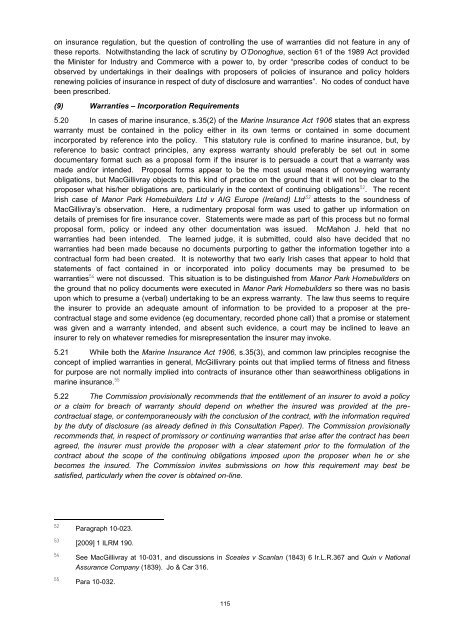Insurance Contracts CP - Law Reform Commission
Insurance Contracts CP - Law Reform Commission
Insurance Contracts CP - Law Reform Commission
Create successful ePaper yourself
Turn your PDF publications into a flip-book with our unique Google optimized e-Paper software.
on insurance regulation, but the question of controlling the use of warranties did not feature in any of<br />
these reports. Notwithstanding the lack of scrutiny by O‟Donoghue, section 61 of the 1989 Act provided<br />
the Minister for Industry and Commerce with a power to, by order ―prescribe codes of conduct to be<br />
observed by undertakings in their dealings with proposers of policies of insurance and policy holders<br />
renewing policies of insurance in respect of duty of disclosure and warranties‖. No codes of conduct have<br />
been prescribed.<br />
(9) Warranties – Incorporation Requirements<br />
5.20 In cases of marine insurance, s.35(2) of the Marine <strong>Insurance</strong> Act 1906 states that an express<br />
warranty must be contained in the policy either in its own terms or contained in some document<br />
incorporated by reference into the policy. This statutory rule is confined to marine insurance, but, by<br />
reference to basic contract principles, any express warranty should preferably be set out in some<br />
documentary format such as a proposal form if the insurer is to persuade a court that a warranty was<br />
made and/or intended. Proposal forms appear to be the most usual means of conveying warranty<br />
obligations, but MacGillivray objects to this kind of practice on the ground that it will not be clear to the<br />
proposer what his/her obligations are, particularly in the context of continuing obligations 52 . The recent<br />
Irish case of Manor Park Homebuilders Ltd v AIG Europe (Ireland) Ltd 53 attests to the soundness of<br />
MacGillivray‘s observation. Here, a rudimentary proposal form was used to gather up information on<br />
details of premises for fire insurance cover. Statements were made as part of this process but no formal<br />
proposal form, policy or indeed any other documentation was issued. McMahon J. held that no<br />
warranties had been intended. The learned judge, it is submitted, could also have decided that no<br />
warranties had been made because no documents purporting to gather the information together into a<br />
contractual form had been created. It is noteworthy that two early Irish cases that appear to hold that<br />
statements of fact contained in or incorporated into policy documents may be presumed to be<br />
warranties 54 were not discussed. This situation is to be distinguished from Manor Park Homebuilders on<br />
the ground that no policy documents were executed in Manor Park Homebuilders so there was no basis<br />
upon which to presume a (verbal) undertaking to be an express warranty. The law thus seems to require<br />
the insurer to provide an adequate amount of information to be provided to a proposer at the precontractual<br />
stage and some evidence (eg documentary, recorded phone call) that a promise or statement<br />
was given and a warranty intended, and absent such evidence, a court may be inclined to leave an<br />
insurer to rely on whatever remedies for misrepresentation the insurer may invoke.<br />
5.21 While both the Marine <strong>Insurance</strong> Act 1906, s.35(3), and common law principles recognise the<br />
concept of implied warranties in general, McGillivrary points out that implied terms of fitness and fitness<br />
for purpose are not normally implied into contracts of insurance other than seaworthiness obligations in<br />
marine insurance. 55<br />
5.22 The <strong>Commission</strong> provisionally recommends that the entitlement of an insurer to avoid a policy<br />
or a claim for breach of warranty should depend on whether the insured was provided at the precontractual<br />
stage, or contemporaneously with the conclusion of the contract, with the information required<br />
by the duty of disclosure (as already defined in this Consultation Paper). The <strong>Commission</strong> provisionally<br />
recommends that, in respect of promissory or continuing warranties that arise after the contract has been<br />
agreed, the insurer must provide the proposer with a clear statement prior to the formulation of the<br />
contract about the scope of the continuing obligations imposed upon the proposer when he or she<br />
becomes the insured. The <strong>Commission</strong> invites submissions on how this requirement may best be<br />
satisfied, particularly when the cover is obtained on-line.<br />
52<br />
53<br />
54<br />
55<br />
Paragraph 10-023.<br />
[2009] 1 ILRM 190.<br />
See MacGillivray at 10-031, and discussions in Sceales v Scanlan (1843) 6 Ir.L.R.367 and Quin v National<br />
Assurance Company (1839). Jo & Car 316.<br />
Para 10-032.<br />
115

















